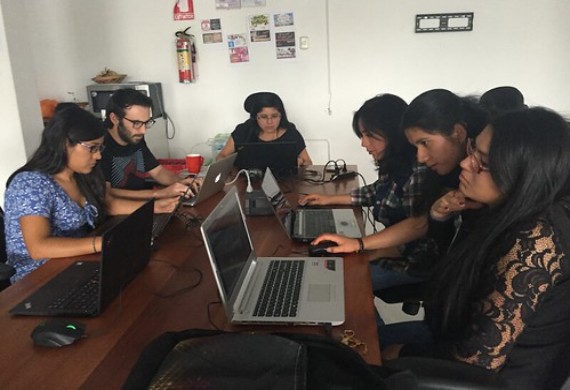
Study Discovers Women-Led Businesses Were Harder Hit During COVID's Peak
By: WE Staff | Friday, 8 July 2022
40,000 enterprises in 49 countries were examined in the study, which was published in The World Bank Research Observer, utilising interviews and data from the Business Pulse Survey and Enterprise Survey programmes of the World Bank.
The information covered nations in East Asia and the Pacific, Europe and Central Asia, Latin America and the Caribbean, the Middle East and North Africa, South Asia, and Sub-Saharan Africa and was centred on businesses of all sizes in the hospitality, manufacturing, retail and wholesale, and service sectors.
Researchers looked at how COVID-19 affected businesses' performance, how they handled the crisis, and how they were able to get assistance from the public. They found a sizable gender discrepancy in each of these areas.
It was discovered that women-owned businesses were on average more than 2 percentage points less likely to report utilising government policy initiatives intended to aid businesses through the crisis.
The researchers suggest that a possible explanation for this is that women entrepreneurs have weaker and fewer social network links than male entrepreneurs.
According to the study, women-owned small companies recovered more slowly from the initial shock of COVID—by an average of 1.4 percentage points—while experiencing 2 percentage points worse revenue declines.
This gender difference was particularly evident in the hospitality sector and in the nations where COVID had the greatest influence.
It was discovered that businesses run by women modify their workforce differently from those run by men, with small enterprises run by women and companies in the hospitality sector being more receptive to giving employees time off or lowering their salary or hours rather than firing them.
As a result of the crisis, women-led small firms were found to be 10.4 percentage points more likely to increase their use of digital technology, while women-led manufacturing companies were shown to be 3.9 percentage points more likely to repackage and reinvent their products. The study also discovered gender differences in the adoption of technology throughout the crisis.
The study team was able to spot trends that go beyond any one nation, region, or industry, making it the first publication to offer a real-time look at the global business effects of the coronavirus pandemic.
Dr. Franklin Maduko, an economics lecturer at the University of Exeter Business School, stated that a number of factors could be at play in the variations in the pandemic's effects on enterprises with men and women in leadership positions. Even within the same sector, women may be offering different goods or services than their male colleagues on the demand side. Additionally, on the supply side, variations in labour supply reactions might also be responsible for some of these effects.
During the pandemic, women were disproportionately more likely than men to need to devote time to housework and childcare due to mobility limitations and closures of schools and daycare centers. Additionally, this might have left female business owners with less time and fewer people available for regular employment.
Most Viewed
- 1 Women's Health Startup HerMD Closing Doors Amid Industry Challenges
- 2 5 Famous Women in Indian Armed Forces
- 3 Saudi Women No longer Require Male Permission for Clothing Choices, says Prince MbS
- 4 Kolkata Medtech Startup Innovodigm Raises Rs 5.5 Crore Seed Funding Led by IAN Group
- 5 Yamunanagar's Kashish Kalra Honoured after Securing 111th Rank in UPSC Civil Services Exam
- 6 Madurai Appoints Its First Woman Corporation Head
- 7 IAS Vijayalakshmi Bidari Appointed as the new Nagpur Divisional Commissioner
- 8 American Entrepreneur Lucy Guo Overtakes T Swift to become Youngest Female Billionaire
- 9 ICC Women's World Cup 2025 Trophy Showcased at Indore's Holkar Stadium
- 10 Aparna Saxena's Beauty Venture AntiNorm Launches in India
- 11 Vidya Nataraj Co-Founded BlueStone Jewellery & Lifestyle files IPO
- 12 5 Women Freedom Fighters of India
- 13 Dr. G Krishnapriya appointed as CEO for Trichy
- 14 M3M & Sirona Partner to Introduce Menstrual Hygiene Vending Machines in 15 Locations
- 15 Punjab Govt launches SHE Cohort 3.0 Supporting Tech-led Women Startups
- 16 Indian origin Lawyer, Sweena Pannu appointed as the US New Superior Court Judge
- 17 The Aurora Tech Award recognizes 4 Indian Women-led Startups
- 18 Kerala's Republic Day parade featured an all-female tableau
- 19 Manisha Kabbur Becomes Karnataka's First Woman International Karate Coach
- 20 Director K. S. Ravikumar's Daughter Maalica Ravikumar Launches Life Coaching Company 'Evergrowth Academy' for Women
- 21 Leezu's Raises Pre-Seed Funding to Accelerate Growth in Sexual Wellness Industry
- 22 Sattu: Super-easy summer drink for PCOS gut healing
- 23 Swathi Nelabhatla creates Sitha App, India's First Women-Exclusive Gig Platform
- 24 7 Timeless Female Kathak Dancers & their Iconic Legacies
- 25 Meet 7 Iconic Women Architects of Modern India & their Most Impactful Work
- 26 This Woman-led Insuretech Startup is Helping Bridge the Education Financing Gap in India
- 27 Women Leaders Share Lessons Learnt from India Women's WC Win
- 28 5 Enterprising Women Founders Powering Singapore's Tech & Innovation Landscape
- 29 4 Women. 4 Stories. One Vision for Smarter, Stronger Healthcare
- 30 Global Gender Gap Narrows to 68.8%, But Full Equality 123 Years Away: WEF Report 2025
- 31 Changemakers: 7 Women Entrepreneurs Taking the Make in India Movement Forward
- 32 Meet Lucy Guo, The Youngest Self-Made Female Billionaire Disrupting Tech
- 33 How Women are Driving India's Festive Online Shopping Surge






